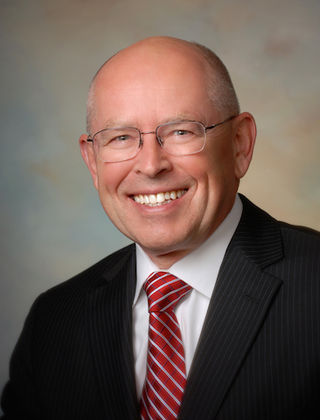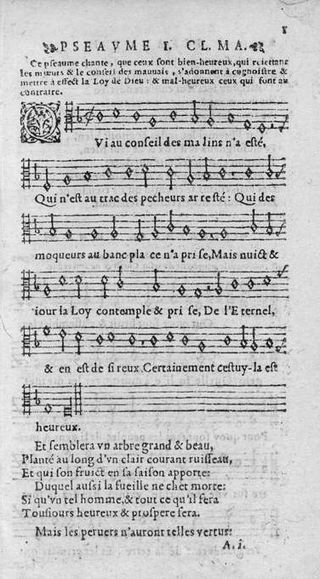Related Research Articles

Sola scriptura is a Christian theological doctrine held by most Protestant Christian denominations, in particular the Lutheran and Reformed traditions, that posits the Bible as the sole infallible source of authority for Christian faith and practice. The Catholic Church considers it heresy and generally the Orthodox churches consider it to be contrary to the phronema of the Church.
Biblical inerrancy is the belief that the Bible "is without error or fault in all its teaching"; or, at least, that "Scripture in the original manuscripts does not affirm anything that is contrary to fact".

Covenant theology is a biblical theology, a conceptual overview and interpretive framework for understanding the overall structure of the Bible. It is often distinguished from dispensational theology, a competing form of biblical theology. It uses the theological concept of a covenant as an organizing principle for Christian theology. The standard form of covenant theology views the history of God's dealings with mankind, from Creation to Fall to Redemption to Consummation, under the framework of three overarching theological covenants: those of redemption, of works, and of grace.
Adiaphoron is the negation of διαφορά diaphora, "difference".

Wayne A. Grudem is an American New Testament scholar, theologian, seminary professor, and author. He is a professor of theology and biblical studies at Phoenix Seminary in Phoenix, Arizona.
Biblical hermeneutics is the study of the principles of interpretation concerning the books of the Bible. It is part of the broader field of hermeneutics, which involves the study of principles of interpretation, both theory and methodology, for all forms of communication, nonverbal and verbal. While Jewish and Christian biblical hermeneutics have some overlap and dialogue, they have distinctly separate interpretative traditions.
The historical-grammatical method is a modern Christian hermeneutical method that strives to discover the biblical authors' original intended meaning in the text. According to the historical-grammatical method, if based on an analysis of the grammatical style of a passage, it appears that the author intended to convey an account of events that actually happened, then the text should be taken as representing history; passages should only be interpreted symbolically, poetically, or allegorically if to the best of our understanding, that is what the writer intended to convey to the original audience. It is the primary method of interpretation for many conservative Protestant exegetes who reject the historical-critical method to various degrees, in contrast to the overwhelming reliance on historical-critical interpretation in biblical studies at the academic level.

Exclusive psalmody is the practice of singing only the biblical Psalms in congregational singing as worship. Today it is practised by several Protestant, especially Reformed denominations. Hymns besides the Psalms have been composed by Christians since the earliest days of the church, but psalms were preferred by the early church and used almost exclusively until the end of the fourth century. During the Protestant Reformation, Martin Luther and many other reformers, including those associated with the Reformed tradition, used hymns as well as psalms, but John Calvin preferred the Psalms and they were the only music allowed for worship in Geneva. This became the norm for the next 200 years of Reformed worship. Hymnody became acceptable again for the Reformed in the middle of the nineteenth century, though several denominations, notably the Reformed Presbyterians, continue the practice of exclusive psalmody.
Kevin Jon Vanhoozer is an American theologian and current research professor of Systematic Theology at Trinity Evangelical Divinity School (TEDS) in Deerfield, Illinois. Much of Vanhoozer's work focuses on systematic theology, hermeneutics, and postmodern theology.
Bibliolatry is the worship of a book, idolatrous homage to a book, or the deifying of a book. It is a form of idolatry. The sacred texts of some religions disallow icon worship, but over time, the texts themselves may come to be treated as sacred in the way idols are; believers may end up worshipping the book in effect. Bibliolatry extends claims of Biblical inerrancy to the texts, precluding theological innovation, evolving development, or progress. Bibliolatry can lead to revivalism, disallows reprobation, and can lead to persecution of unpopular doctrines.
Bruce K. Waltke is an American Reformed evangelical professor of Old Testament and Hebrew. He has held professorships in the Old Testament at Dallas Theological Seminary, Regent College in Vancouver, British Columbia, Westminster Theological Seminary in Philadelphia, Pennsylvania, Reformed Theological Seminary in Orlando, Florida, and Knox Theological Seminary in Ft. Lauderdale, Florida.
Clarence Hassell Bullock is an American Old Testament scholar and former president of the Evangelical Theological Society. He was a professor at Wheaton College in Illinois from 1973 until his retirement in 2009.

In Christianity, the term biblical authority refers to two complementary ideas:
Peter Eric Enns is an American Biblical scholar and theologian. He has written widely on hermeneutics, Christianity and science, historicity of the Bible, and Old Testament interpretation. Outside of his academic work Enns is a contributor to HuffPost and Patheos. He has also worked with Francis Collins' The BioLogos Foundation. His book Inspiration and Incarnation challenged conservative/mainstream Evangelical methods of biblical interpretation. His book The Evolution of Adam questions the belief that Adam was a historical figure. He also wrote The Bible Tells Me So: Why Defending Scripture Has Made Us Unable to Read It and The Sin of Certainty: Why God Desires Our Trust More than Our 'Correct' Beliefs.

Grant R. Osborne was an American theologian and New Testament scholar. He was Professor of New Testament at Trinity Evangelical Divinity School.
George William Knight III was an ordained minister in the Orthodox Presbyterian Church. He was a theologian, author, preacher, churchman, and adjunct professor of New Testament at Greenville Presbyterian Theological Seminary in Taylors, South Carolina. Formerly, he was the founding Dean and Professor of New Testament at Knox Theological Seminary. Prior to his appointment at Knox Theological Seminary, he taught New Testament and New Testament Greek at Covenant Theological Seminary in St. Louis, Missouri. As a pastor, he planted Covenant Presbyterian Church in Naples, Florida and has served numerous other local churches in the Presbyterian Church in America and the Orthodox Presbyterian Church. A former president of the Evangelical Theological Society, he has also taught and preached the Bible at many other seminaries and churches around the world. He has authored several works, most notably The Pastoral Epistles and a short commentary of Timothy and Titus as included in the Baker Commentary on the Bible. He received his theological doctorate from Free University of Amsterdam in 1968. Dr. Knight was a member of the General Assembly-appointed Ad Interim Committee to study the number of ordained offices in the Presbyterian Church in America according to Scripture. His Ad Interim Report of the Number of Offices by George W. Knight IIIArchived 2011-09-27 at the Wayback Machine was incorporated into the polity of the Presbyterian Church in America. He also served on an ad interim committee to study the issue of marriage, divorce and remarriage, which brought about the 1992 publication of a Position Paper of the Presbyterian Church in America on Remarriage and Divorce, 1992.Archived 2011-09-27 at the Wayback Machine.

1 Timothy 2:12 is the twelfth verse of the second chapter of the First Epistle to Timothy. It is often quoted using the King James Version translation:
But I suffer not a woman to teach, nor to usurp authority over the man, but to be in silence.

Brevard Springs Childs was an American Old Testament scholar and Professor of Old Testament at Yale University from 1958 until 1999, who is considered one of the most influential biblical scholars of the 20th century.

The regulative principle of worship is a Christian doctrine, held by some Calvinists and Anabaptists, that God commands churches to conduct public services of worship using certain distinct elements affirmatively found in scripture, and conversely, that God prohibits any and all other practices in public worship. The doctrine further determines these affirmed elements to be those set forth in scripture by express commands or examples or, if not expressed, those implied logically by good and necessary consequence. The regulative principle thus provides a governing concept of worship as obedience to God, identifies the set of specific practical elements constituting obedient worship, and identifies and excludes disobedient practices.
Church music during the Reformation developed during the Protestant Reformation in two schools of thought, the regulative and normative principles of worship, based on reformers John Calvin and Martin Luther. They derived their concepts in response to the Catholic church music, which they found distracting and too ornate. Both principles also pursued use of the native tongue, either alongside or in place of liturgical Latin.
References
- ↑ Smith, Christian (2011). "God-Honoring Worship". The Bible Made Impossible: Why Biblicism Is Not a Truly Evangelical Reading of Scripture. Grand Rapids, Michigan: Brazos Press. pp. 34–6. ISBN 978-1-58743-303-0.